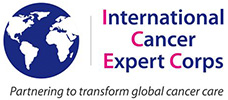Prevention and sound health policies are key components to reducing the incidence and consequences of cancer. Given the number of people who already have and will be diagnosed with cancer, treatments are needed to provide a cure and/or relief of symptoms.
To help fill the huge gap in cancer care, ICEC aims to establish person-to-person sustainable relationships at a global level such that mentors and partners can work effectively together, to help create workforce capacity and capability.
The Experts working with ICEC include the broad range of expertise needed to address public health oncology. The problem requires expertise from medical, health system, business, workforce, economic and ethical perspectives.
Expertise has been listed in three general categories of Expert Mentors– medical, science non-medical and supporting disciplines- recognizing there is overlap.
For each of these categories, there is an Expert Panel consisting of a leader and members, the goal of which is to have 20% of their time committed to ICEC activities (8 hours per week, on average). The full-time equivalent (FTE) concept is used so that 5 people contributing 20% of their time would be 1 FTE. In the roll-out of ICEC there will be a limited number of ICEC centers/associates, hubs and experts.
ICEC committees oversee the application process and the functioning and progress of the experts, center, associates and hubs.
The ‘Career Path’ subcommittee of the ‘Experts Committee’ work with academic institutions to develop proposed metrics, for promotion along a career path in global health. This is voluntary by the institutions, but the availability of metrics and leadership from academic institutions as well as interested practices may facilitate this type of activity becoming a career path.
Medical
- Radiation oncologists
- Medical oncologists
- Pediatric oncologists
- Surgical oncologists
- Nurses
- Pathologists
- Radiologists
- Surgeons - general
- Surgical subspecialists
- Pharmacologists
- Psychologists
- Public health
Science, non-MD
- Prevention and screening
- Epidemiologists
- Medical physicists
- Technologists
- Basic & translational scientists
- Treatment guidelines
- Statisticians
- Social scientists
- Regulatory Affairs specialists
- Pharmacists
Support
- Educational tools
- Finance
- Clinic Administration
- International policy
- Patient advocacy
- Economists
- Social workers
- Communications
- Cancer survivors
- Information tech (IT)
- Data-management
- Legal

